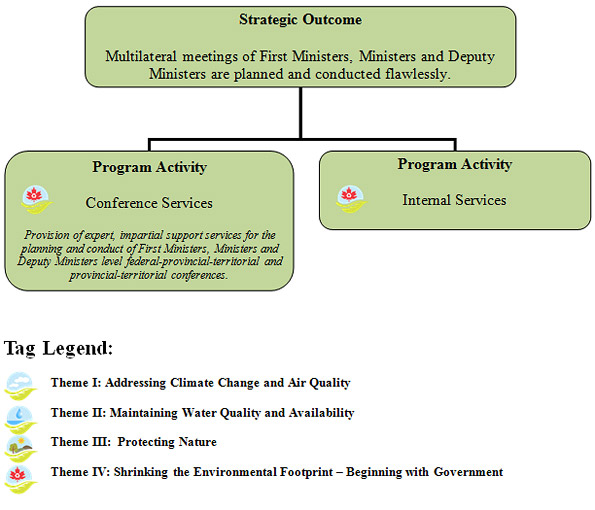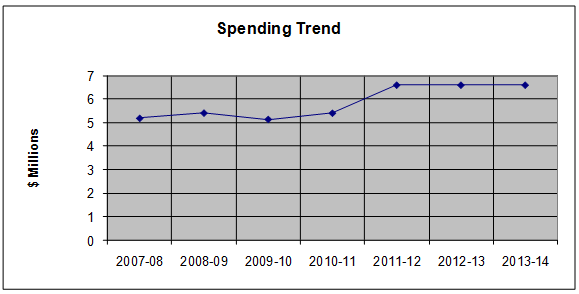Common menu bar links
Breadcrumb Trail
ARCHIVED - Canadian Intergovernmental Conference Secretariat - Report
 This page has been archived.
This page has been archived.
Archived Content
Information identified as archived on the Web is for reference, research or recordkeeping purposes. It has not been altered or updated after the date of archiving. Web pages that are archived on the Web are not subject to the Government of Canada Web Standards. As per the Communications Policy of the Government of Canada, you can request alternate formats on the "Contact Us" page.
Minister's Message
I am pleased to table The Canadian Intergovernmental Conference Secretariat’s (CICS) Report on Plans and Priorities for the fiscal year 2011-12.
The Secretariat is an institution dedicated to supporting senior level intergovernmental conferences, an important feature of Canadian federalism. CICS provides professional services of the highest quality in organizing federal-provincial-territorial and provincial-territorial meetings of First Ministers, Ministers and Deputy Ministers. The unique value that CICS brings to these meetings, in terms of experience, professionalism, non-partisanship, consistency and continuity are key factors that contribute to their overall success.
During fiscal year 2011-12 CICS will pursue its strategy to re-energize partnerships with governments, improve its service delivery model and implement innovative management practices to better serve its clients and provide them with significant cost efficiencies and economies of scale.
The Honourable Peter Penashue
President of the Queen’s Privy Council for Canada
Minister of Intergovernmental Affairs
Section I: Departmental Overview
Raison d’être and Responsibilities
The Canadian Intergovernmental Conference Secretariat (CICS) was established pursuant to an agreement reached at the May 1973 First Ministers’ Conference and designated a department of the federal government by an Order-in-Council dated November 29, 1973. Its one program mandate is to provide administrative services for the planning and conduct of First Ministers, Ministers and Deputy Ministers level federal-provincial-territorial and provincial-territorial conferences.
CICS is an agency of the federal and provincial governments and, as such, acts as a neutral intergovernmental body. Its budget is supported by both orders of government and its staff includes federal and provincial/territorial public servants. The Secretary reports to all governments annually. The operations are reviewed by federal and provincial senior officials designated by their respective First Ministers. CICS reports to Parliament through the President of the Queen’s Privy Council for Canada.
The mandate of the Secretariat is to serve federal, provincial and territorial governments in the planning, conduct, and the serving of senior level intergovernmental conferences held across Canada. The primary objective of CICS is to relieve client departments in virtually every major sector of intergovernmental activity, of the numerous technical and administrative tasks associated with the planning and conduct of multilateral conferences, thereby enabling them to concentrate on the substantive policy issues. CICS provides continuous, effective, impartial administrative services to these meetings.
Strategic Outcome and Program Activity Architecture (PAA)
In order to effectively pursue its mandate, CICS aims to achieve the following strategic outcome:
Multilateral meetings of First Ministers, Ministers and Deputy Ministers are planned and conducted flawlessly.
Program Activity Architecture (PAA)
CICS is a micro agency with a single program mandate. Its Program Activity Architecture is presented below.

Planning Summary
CICS’ key priority for 2011-12 is to plan, conduct and flawlessly serve intergovernmental conferences at the most senior level in response to requests by federal, provincial and territorial governments. The Secretariat is funded at a level sufficient to finance conference activity in the 110-120 range.
For an organization such as CICS, success and credibility is based on continued performance of the highest quality. Consequently, CICS is constantly looking for ways to enhance its level of client services.
To respond to the evolving nature of the environment in which the organization operates, CICS has developed a corporate strategic plan which identifies objectives and priorities that ensure the continuous success and relevance of the agency. This initiative will define CICS’ short-term and long term priorities, maximize opportunities and overcome challenges such as succession planning and adapting to the current economic environment.
As a result of its strategic direction CICS will continue to review, in 2011-12, its service delivery model with the ultimate goal of enhancing its services to clients and providing economies of scale that contribute to effective intergovernmental collaboration. CICS will be looking at the utilization of various technologies and processes that may be implemented to increase our efficiency and provide enhanced services to senior level intergovernmental meetings.
The Secretariat will sustain its effort to modernize its corporate management and key business processes and reporting capability in 2011-12 in order to provide effective tools for management decisions making process while ensuring that the agency responds in a timely manner to central and other agencies requirements.
| 2011–12 | 2012–13 | 2013–14 |
|---|---|---|
| 6.6 | 6.6 | 6.6 |
| 2011–12 | 2012–13 | 2013–14 |
|---|---|---|
| 36 | 36 | 36 |
Financial Resources ($ millions)
| Performance Indicators | Targets |
|---|---|
| Extent to which senior government officials are satisfied with various CICS services in the planning and conduct of multilateral meetings of First Ministers, Ministers and Deputy Ministers. | 90% satisfaction- High degree of stakeholder trust and confidence in CICS’ institutional independent role and high degree of satisfaction with CICS services. |
| Program Activity | Forecast Spending 2010–11 |
Planned Spending | Alignment to Government of Canada Outcomes | ||
|---|---|---|---|---|---|
| 2011–12 | 2012–13 | 2013–14 | |||
|
Intergovernmental Conference Services |
3.6 | 4.4 | 4.4 | 4.4 | Well-managed and efficient government operations. |
| Total Planned Spending | 4.4 | 4.4 | 4.4 | ||
| Program Activity | Forecast Spending 2010–11 |
Planned Spending | ||
|---|---|---|---|---|
| 2011–12 | 2012–13 | 2013–14 | ||
| Internal Services | 1.8 | 2.2 | 2.2 | 2.2 |
Contribution of Priorities to Strategic Outcome
| Operational Priorities | Type | Links to Strategic Outcome | Description |
|---|---|---|---|
| Continuous improvement of our services by adopting the necessary tools to evolve our delivery model for the planning and conduct of senior-level intergovernmental conferences. | Ongoing | Multilateral meetings of First Ministers, Ministers and Deputy Ministers are planned and conducted flawlessly. |
This priority recognizes that the needs of our clients are evolving. It will encourage reflection and innovation within the organization and assist us to develop a more flexible array of services that continue to be of the highest quality and relevant to our clients. Plans for meeting the priority
|
| Re-energize our partnerships through increased engagement with stakeholders and clients to ensure that the Secretariat remains the preferred choice of governments for senior-level intergovernmental conference support. | Ongoing; escalated | Multilateral meetings of First Ministers, Ministers and Deputy Ministers are planned and conducted flawlessly. |
This priority will build on a solid foundation with our well established client base to enhance visibility and strengthen loyalty while at the same time seek to attract new sectors within our mandate. It will ensure that communication is open and on-going and will allow us to confirm and/or revise our mandate and role.
|
| Management Priorities | Type | Links to Strategic Outcome | Description |
|---|---|---|---|
| To strengthen internal management practices at CICS. | Ongoing | Multilateral meetings of First Ministers, Ministers and Deputy Ministers are planned and conducted flawlessly. |
This priority will contribute to achieving excellence in management practices, resulting in effective and efficient use of resources in support of conference service delivery. In addition, financial and non-financial practices will be reviewed to ensure transparency and accountability. Plans for meeting this priority
|
Risk Analysis
As an organization that services the senior level intergovernmental conference activities undertaken by 14 jurisdictions and their respective departments, CICS has no control over the timing, location and costs of such meetings. The Secretariat is funded annually at a level sufficient to finance a level of conference activity in the 110-120 range. Over a ten-year period, we were averaging over 100 conferences annually. However, instability in political environments and more recently the economic recession has led to what is seen as a temporary decline in intergovernmental activities over the last several years.
The flawless delivery of high quality services to the Secretariat’s clients is only made possible by the total dedication and commitment of the agency's personnel; personnel which possesses the aptitudes, character and devotion necessary for efficient CICS operations. Furthermore, retention of corporate memory and conference practices, procedures and protocols are fundamental to the success of CICS in carrying out its mandate. CICS departmental clients are also subject to high turnover rates among the staff assigned to conference planning. Consequently, CICS personnel play a key role in providing new contacts with pertinent information on the practices and processes related to intergovernmental machinery.
Given that CICS reports to 14 governments, it must ensure that its services not only remain pertinent, impartial, confidential and equitable to all clients but, more critical, that they be perceived as such in an environment that often can be highly political.
As a result, the Secretariat has always been cognizant of the importance of risk management issues and continues to make steady progress towards the effective implementation of integrated risk management. CICS’ highest risks continue to be:
- Maintaining the credibility of the agency as a neutral conference service provider;
- Maintaining continuity of CICS’ conference services capability and supporting infrastructure;
- Maintaining due diligence and reporting on appropriate controls, given the increased emphasis on accountability, delegated authority and resources management;
- The ability to react and adjust to expansions and reductions within the requests for CICS services;
- Access to qualified personnel; and
- Retention of corporate memory and practices.
Expenditure Profile
As a micro agency, with a unique mandate, CICS’ organizational structure must be capable of delivering services for up to 120 distinct conferences annually. The spending on the program has usually come in under the estimated and allotted funding each year, as various environmental circumstances have resulted in lower activity in recent periods. As per an agreement, the provinces contribute up to 50% of the operational cost of CICS, less employee benefit plans, translations costs and tenant services. These contributions are made to the Receiver General’s Consolidated Revenue Funds. The following chart shows actual and anticipated spending over the next several years.

Estimates by Vote
Estimates by Vote are presented in the 2011–12 Main Estimates which are available here: http://www.tbs-sct.gc.ca/est-pre/20112012/me-bpd/info/info-eng.asp.
